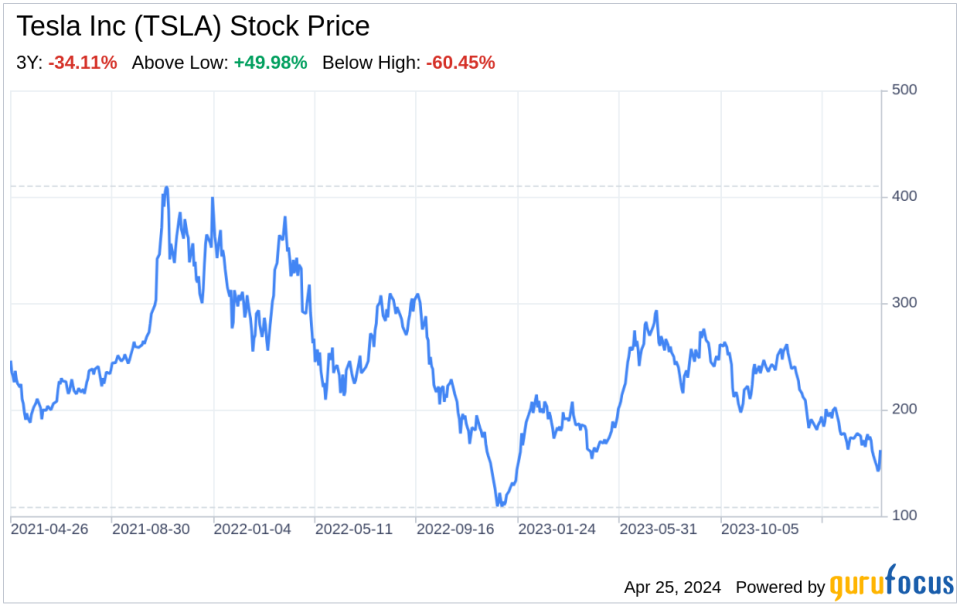Decoding Tesla Inc (TSLA): A Strategic SWOT Insight
Despite a decrease in net income, Tesla Inc (NASDAQ:TSLA) maintains a strong market position with innovative technology and brand reputation.
Challenges in production and legal proceedings highlight areas for improvement and risk mitigation.
Opportunities for growth in the sustainable energy sector and global infrastructure expansion remain significant.
External threats such as industry competition and economic fluctuations could impact Tesla's performance.
On April 24, 2024, Tesla Inc (NASDAQ:TSLA) filed its latest 10-Q with the SEC, providing a snapshot of the company's financial health and operational performance. Founded in 2003, Tesla is not just an automotive company; it's a vertically integrated sustainable energy company with a mission to transition the world to electric mobility. The company's recent SEC filing reveals a mix of financial highlights and challenges. While total revenues saw a dip from $23.33 billion in Q1 2023 to $21.30 billion in Q1 2024, Tesla's ability to maintain a strong balance sheet with $26.86 billion in cash and cash equivalents and investments is noteworthy. However, net income attributable to common stockholders decreased significantly from $2.51 billion in Q1 2023 to $1.13 billion in Q1 2024, reflecting a need for strategic adjustments. This SWOT analysis will delve into the strengths, weaknesses, opportunities, and threats as presented in the recent filing, offering investors a comprehensive view of Tesla's current position and future prospects.

Strengths
Brand Power and Market Position: Tesla Inc (NASDAQ:TSLA) continues to hold a formidable position in the electric vehicle (EV) market, bolstered by its strong brand recognition and loyal customer base. The company's reputation for innovation, particularly in electric powertrain technology and autonomous driving features, sets it apart from traditional automotive competitors. Tesla's brand is synonymous with sustainability and cutting-edge technology, which appeals to a growing demographic of environmentally conscious consumers. The company's direct sales model and global network of Superchargers further strengthen its market position, providing a seamless and unique customer experience.
Financial Resilience: Despite a decrease in net income, Tesla's financial resilience is evident in its substantial cash reserves. With $26.86 billion in cash and cash equivalents and investments, Tesla is well-positioned to navigate economic uncertainties and invest in growth initiatives. This financial stability enables the company to fund research and development, expand its manufacturing capabilities, and explore new market opportunities without relying heavily on external financing.
Weaknesses
Production Challenges: Tesla's recent SEC filing indicates a decline in automotive sales revenue by 13% compared to the previous year, primarily due to lower average selling prices and a decrease in Model 3 and Model Y deliveries. This points to production challenges, including the early phase of the updated Model 3 production ramp and factory shutdowns at Gigafactory Berlin-Brandenburg. These issues underscore the need for Tesla to enhance its production efficiency and manage supply chain disruptions effectively to meet demand and maintain profitability.
Legal and Regulatory Risks: Tesla faces ongoing legal proceedings, including allegations of systemic race discrimination and harassment. The financial and reputational risks associated with such litigation can be significant. The company's recent settlement in the Diaz case and other ongoing lawsuits highlight the need for robust compliance and risk management practices to mitigate potential legal liabilities and protect the brand's integrity.
Opportunities
Sustainable Energy Sector Growth: The global shift towards sustainable energy presents significant opportunities for Tesla. The company's energy generation and storage segment is poised for growth as demand for renewable energy solutions increases. Tesla's solar panels, solar roofs, and battery storage products cater to a market that is expected to expand as governments and consumers prioritize green energy. This aligns with Tesla's mission and offers a pathway for diversification and revenue growth beyond automotive sales.
Global Infrastructure Expansion: Tesla's international expansion, including the construction of new Gigafactories and the extension of its Supercharger network, presents opportunities for increased market penetration and sales. The company's plans to introduce new vehicle models and leverage its manufacturing presence in key markets like China and Europe can drive growth and solidify Tesla's position as a global leader in electric mobility.
Threats
Intensifying Competition: The electric vehicle market is becoming increasingly competitive as traditional automakers and new entrants ramp up their EV offerings. Companies like Volkswagen, General Motors, and startups such as Rivian are investing heavily in electric mobility, which could erode Tesla's market share if it does not continue to innovate and differentiate its products. The competitive landscape requires Tesla to maintain its technological edge and customer appeal to stay ahead.
Economic and Regulatory Fluctuations: Tesla's performance is susceptible to economic fluctuations, including interest rate changes, inflationary pressures, and trade uncertainties. These factors can affect consumer purchasing power and impact vehicle sales. Additionally, changes in government incentives for electric vehicles and environmental regulations can influence market dynamics. Tesla must navigate these external factors strategically to sustain its growth trajectory.
In conclusion, Tesla Inc (NASDAQ:TSLA) exhibits a robust set of strengths, including a powerful brand and financial resilience, which position it well in the competitive landscape. However, the company must address its weaknesses, such as production inefficiencies and legal challenges, to maintain its upward trajectory. Opportunities in the sustainable energy sector and global infrastructure expansion offer promising avenues for growth, while threats from increasing competition and economic uncertainties require vigilant management. Overall, Tesla's strategic approach to leveraging its strengths and opportunities while addressing its weaknesses and threats will be critical in shaping its future success.
This article, generated by GuruFocus, is designed to provide general insights and is not tailored financial advice. Our commentary is rooted in historical data and analyst projections, utilizing an impartial methodology, and is not intended to serve as specific investment guidance. It does not formulate a recommendation to purchase or divest any stock and does not consider individual investment objectives or financial circumstances. Our objective is to deliver long-term, fundamental data-driven analysis. Be aware that our analysis might not incorporate the most recent, price-sensitive company announcements or qualitative information. GuruFocus holds no position in the stocks mentioned herein.
This article first appeared on GuruFocus.
